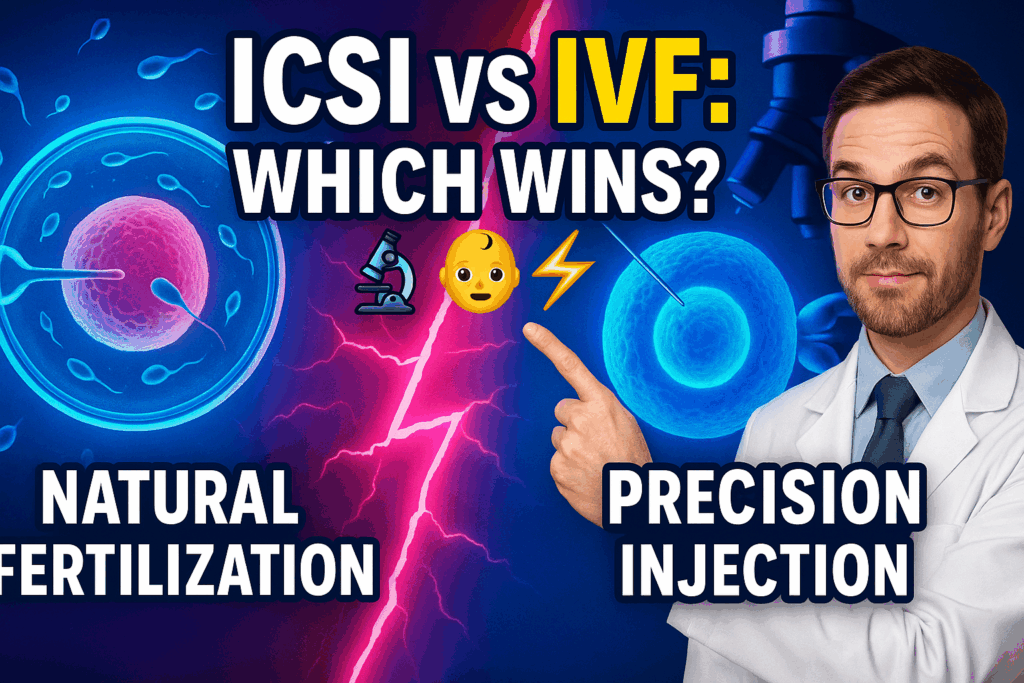
When it comes to assisted reproductive technologies (ART), In Vitro Fertilization (IVF) and Intracytoplasmic Sperm Injection (ICSI) are two of the most commonly used treatments for infertility. While both procedures involve fertilizing an egg outside the body, they differ in key ways.
In this blog, we’ll explore:
✅ What IVF is and how it works
✅ What ICSI is and how it differs from IVF
✅ When ICSI is recommended over IVF
✅ Success rates and risks of both procedures
1. What is IVF?
In Vitro Fertilization (IVF) is a fertility treatment where eggs are retrieved from a woman’s ovaries and fertilized with sperm in a laboratory. The resulting embryos are then transferred into the uterus.
How IVF Works:
- Ovarian Stimulation: Fertility medications stimulate the ovaries to produce multiple eggs.
- Egg Retrieval: A minor surgical procedure collects the mature eggs.
- Sperm Collection: A semen sample is provided by the male partner or a donor.
- Fertilization in the Lab: Eggs and sperm are combined in a dish for natural fertilization.
- Embryo Culture: Fertilized eggs develop into embryos over 3-5 days.
- Embryo Transfer: The best-quality embryo(s) are placed into the uterus.
Who is IVF For?
- Women with blocked fallopian tubes
- Couples with unexplained infertility
- Male factor infertility (mild cases)
- Those needing donor eggs or sperm
2. What is ICSI?
Intracytoplasmic Sperm Injection (ICSI) is a specialized form of IVF where a single sperm is injected directly into an egg to facilitate fertilization.
How ICSI Works:
The process is similar to IVF, except:
- Instead of mixing sperm and eggs in a dish, an embryologist selects a single healthy sperm.
- The sperm is injected directly into the egg using a fine needle.
- The fertilized egg (embryo) is then transferred into the uterus.
Who is ICSI For?
- Severe male infertility (low sperm count, poor motility, abnormal morphology)
- Previous IVF failures (failed fertilization in standard IVF)
- Frozen sperm samples (limited quantity)
- Sperm retrieved surgically (TESA, PESA, or micro-TESE)
3. Key Differences Between IVF and ICSI
| Feature | IVF | ICSI |
|---|---|---|
| Fertilization Method | Sperm and egg mixed in a dish | Single sperm injected into egg |
| Sperm Requirement | Needs moderate sperm count & motility | Works with very low sperm count |
| Success Rate (Fertilization) | ~50-70% (depends on sperm quality) | ~70-80% (higher for male infertility) |
| Cost | Generally lower | Slightly more expensive |
| Used For | Unexplained infertility, tubal factors | Severe male infertility, IVF failures |
4. Which is Better: IVF or ICSI?
Neither is inherently “better”—it depends on the cause of infertility.
- IVF is sufficient when sperm quality is normal.
- ICSI is necessary when sperm cannot penetrate the egg naturally.
Some clinics use ICSI for all IVF cases to maximize fertilization chances, but it’s not always needed.
5. Success Rates and Risks
Success Rates:
- IVF: ~40-50% per cycle (varies by age and clinic)
- ICSI: Similar to IVF but higher fertilization rates in male infertility cases
Risks:
Both procedures carry similar risks:
- Multiple pregnancies
- Ovarian hyperstimulation syndrome (OHSS)
- Slight risk of birth defects (marginally higher with ICSI)
6. Conclusion: IVF vs. ICSI
- IVF is the standard procedure where sperm and egg are combined naturally in a lab.
- ICSI is an advanced technique where a single sperm is injected into the egg—ideal for male infertility.
If you’re considering fertility treatment, consult a reproductive specialist to determine whether IVF or ICSI is right for you.
FAQs
Q: Is ICSI more successful than IVF?
A: Only for male infertility—otherwise, success rates are similar.
Q: Can ICSI be done with frozen sperm?
A: Yes, ICSI is often used with frozen or surgically retrieved sperm.
Q: Does ICSI guarantee pregnancy?
A: No, but it improves fertilization chances in severe male infertility cases.
Q: Is ICSI more expensive than IVF?
A: Yes, by about $1,000-$2,000 due to the specialized procedure.

